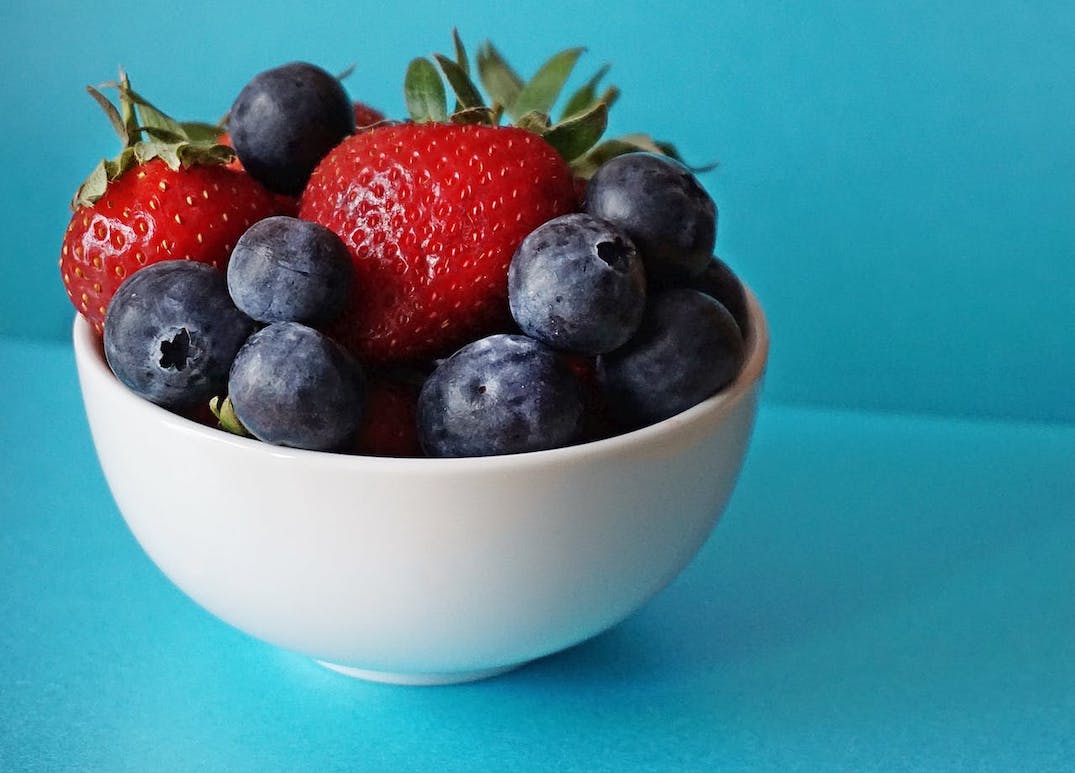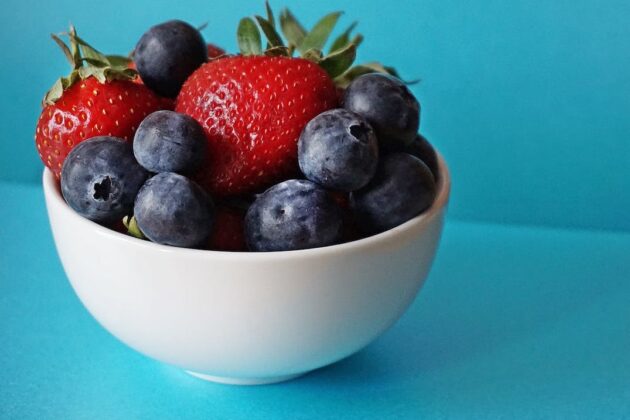7-Day Meal Plan for Pancreatitis (With Printable PDF)
If you’re suffering from pancreatitis, you know that diet is crucial to symptom management and recovery. Pancreatitis occurs when your pancreas becomes inflamed, causing severe abdominal pain, nausea, vomiting, fever, rapid heart rate, and weight loss.
There are several potential causes of pancreatitis, including certain medications, the presence of gallstones, alcohol abuse, and autoimmune conditions. It can either be acute, where it may only last for a short period and resolve, or chronic.
Whether you have acute or chronic pancreatitis, it can be challenging to manage your symptoms. Choosing a proper diet for pancreatitis is essential but not always easy.
The pancreas helps our body digest fats. When it is inflamed, consuming high-fat foods can aggravate it, so a low-fat diet is recommended. It’s also better to choose easily digestible foods and avoid alcohol.
Your pancreas is also responsible for secreting insulin so consuming sugary foods or foods high in refined carbohydrates is discouraged as this can cause your pancreas to overproduce insulin.
Because there are so many restrictions, it can feel overwhelming, and even a little scary, choosing foods to eat, but there’s no need to fret.
Below you’ll find a 7-day meal plan for pancreatitis, including a printable pancreatitis meal plan PDF, the best foods to eat, which to avoid, and everything else you need to know.

Improve your gut health with support from a Registered Dietitian
90% of Zaya Care patients pay $0 for dietitian visits
7-day meal plan for pancreatitis
If you’ve ever had pancreatitis, you know you wouldn’t wish it on your worst enemy. The symptoms alone are motivation enough for you to want to make the necessary adjustments in your diet.
But diet is more than just helpful for your uncomfortable symptoms, it’s also important to allow your pancreas to heal.
If you’re new to navigating a pancreatitis diet, below is a sample 7-day, 1,800-calorie meal plan that includes foods that are safe to eat while avoiding those that may irritate the pancreas. You can download and print the pancreatitis meal plan PDF here.
Always talk to your doctor or dietitian before making any drastic changes to your diet and learn what is best for your situation. Your ideal diet may have more or fewer calories and incorporate different foods based on intolerances, preferences, and other medical conditions.
Day 1
- Breakfast:
- Oatmeal with a sliced banana
- Toast with a thin layer of jam
- Lunch:
- Grilled chicken salad with lettuce, cucumber, and a light vinaigrette
- A small apple
- Dinner:
- Baked white fish with lemon
- Steamed carrots and zucchini
- White rice
- Snack:
- A cup of blueberries
- A small yogurt (low-fat)
Day 2
- Breakfast:
- Scrambled egg whites
- Whole grain toast
- A cup of cantaloupe
- Lunch:
- Turkey breast sandwich with lettuce on whole-wheat bread
- A small peach
- Dinner:
- Baked chicken breast
- Steamed broccoli and cauliflower
- Quinoa
- Snack:
- A handful of grapes (read more about how grapes can help with weight loss)
- A rice cake
Day 3
- Breakfast:
- Smoothie with low-fat yogurt, strawberries, and a small banana
- Lunch:
- Lentil soup with vegetables
- A slice of whole-grain bread
- Dinner:
- Grilled shrimp
- Green beans
- Couscous
- Snack:
- An apple
- A handful of almonds
Day 4
- Breakfast:
- Low-fat cottage cheese with pineapple chunks
- A slice of whole-wheat toast
- Lunch:
- Vegetable stir-fry with tofu and a small amount of soy sauce
- Brown rice
- Dinner:
- Poached salmon
- Mixed vegetables (carrots, peas, and spinach)
- Mashed potatoes
- Snack:
- A banana
- A few whole-grain crackers
Day 5
- Breakfast:
- Wheat cereal with skim milk
- A small orange
- Lunch:
- Chicken noodle soup
- A small green salad with light dressing
- Dinner:
- Lean pork loin
- Steamed asparagus
- Baked sweet potato
- Snack:
- A pear
- Low-fat yogurt
Day 6
- Breakfast:
- Cooked barley with a splash of almond milk
- A few slices of watermelon
- Lunch:
- Baked turkey meatballs
- Whole-wheat pasta with marinara sauce
- Steamed green beans
- Dinner:
- Baked cod
- Roasted bell peppers and zucchini
- Couscous
- Snack:
- An apple
- A small handful of walnuts
Day 7
- Breakfast:
- Greek yogurt with a drizzle of honey and a few raspberries
- Whole-grain toast
- Lunch:
- Grilled chicken wrap with lettuce and a bit of avocado
- A small nectarine
- Dinner:
- Vegetable curry with tofu (low-fat)
- Basmati rice
- Snack:
- A peach
- A few rice cakes

Improve your gut health with support from a Registered Dietitian
90% of Zaya Care patients pay $0 for dietitian visits
Best foods to eat with pancreatitis
It can be easy to focus on foods you know you can’t have but that can also feel overwhelming, especially in light of a new diagnosis. Instead, think of everything you can have and start from there.
During an initial flare-up, you may be advised to not eat or drink anything for a few days. Your doctor will let you know when it’s safe to consume foods again and may provide specific recommendations.
Below are some of the best foods to start including in your diet to ensure you are giving your body what it needs to recover quickly.
Low-fat foods
Choosing low-fat foods is essential for pancreatitis recovery. This helps to avoid further aggravation of the pancreas during digestion. Some of the best low-fat foods include:
- Fruits
- Vegetables
- Whole grains like quinoa, oats, whole grain crackers
- Beans and legumes
- Low-fat dairy products like low-fat yogurt, skim milk, reduced-fat cheeses
Lean meat
Lean meats that are baked, grilled, or broiled without oils are excellent options during a pancreatitis flare-up. Protein is essential for preventing muscle loss and malnutrition, especially in those with chronic pancreatitis. Try:
- skinless chicken or turkey
- fish like salmon, tuna, and cod
- canned fish packed in water (not oil)
Foods to avoid with pancreatitis
To avoid worsening your pancreatitis flare-up, you should be aware of what foods to avoid. Below are some foods you want to steer clear of as they can lengthen recovery time:
- Fried and greasy foods. Fried and greasy foods such as fried chicken, onion rings, French fries, and foods cooked in large amounts of butter can overload your pancreas and cause it to become even more inflamed.
- Full-fat dairy. Full-fat dairy products such as whole milk, full-fat cheeses, and ice cream can also be difficult to digest. This can lead your pancreas to over-produce the enzymes needed to break these down and further worsen a pancreatitis attack.
- High-fat snack foods. Other high-fat foods include processed snacks such as chips, cookies, and baked goods. Processed foods like these should be avoided even if they are low-fat options as these also likely contain high amounts of refined carbohydrates and sugars which are equally hard on your pancreas during digestion.
- Processed meats. Processed meats such as bacon, sausage, and deli meats contain high amounts of fats as well as other harmful compounds from processing that can aggravate the pancreas. In fact, studies have found high intake of processed meats can increase the risk of pancreatic cancer because of these compounds.
- Foods high in added sugars. Because the pancreas is also responsible for releasing insulin, consuming sugary foods can cause it to release too much insulin. It can also increase triglyceride levels which can initiate another attack.
- Spicy foods. Spicy foods, such as hot sauces and chili peppers, can worsen pancreatitis symptoms in some. While they don’t directly affect the pancreas, they can irritate digestion which can increase discomfort.
- Gas-inducing foods. Foods that are likely to cause gas, such as high-fiber foods and cruciferous vegetables, are best avoided during a pancreatitis flare-up. A high-fiber diet may reduce pancreatic enzyme function, particularly in those with chronic pancreatitis.
- Alcohol. Excessive alcohol consumption can worsen an existing attack of pancreatitis and provoke future attacks. Alcohol alters pancreatic secretions which can cause inflammation that leads to chronic alcoholic pancreatitis and severe damage to the pancreas.
Other diet-related tips for managing pancreatitis
Aside from specific foods to eat and those to avoid, below are some other important dietary considerations to help you manage your pancreatitis symptoms and promote faster healing.
- Eat small, frequent meals. Consuming smaller meals more often throughout the day can help aid in digestion and avoid overloading the pancreas. Instead of three large meals, consider five to six smaller meals spaced out every two to three hours.
- Use low-fat cooking methods. To keep fat levels down, pay attention to your cooking methods. Instead of using butter or oil or frying foods, consider broiling, grilling, roasting, baking, poaching, or steaming methods instead.
- Increase fluid intake. Pancreatitis increases fluid loss and makes you more susceptible to dehydration. Prioritize adequate water intake and avoid dehydrating beverages such as sugar-sweetened and caffeinated drinks.
- Limit caffeine consumption. Caffeine can worsen dehydration so it’s better to limit caffeine during a pancreatitis flare-up. Avoid consuming large amounts of beverages like coffee, tea, dark sodas, and energy drinks.
- Chew food thoroughly. Eat slowly and chew your food thoroughly to help improve digestion. This can optimize absorption so your pancreas doesn’t have to work so hard.
- Keep a food diary. Consider keeping a food diary to help track your intake and your symptoms. This can help you stay on track with eating the right foods and identify those that may be bothersome during a flare-up.
- Consult a dietitian for personalized advice. If you’re having a hard time managing your pancreatitis symptoms or need further guidance on a pancreatitis diet, consider working with a Registered Dietitian (RD) to give you personalized recommendations.
Why you should consider working with a dietitian if you have pancreatitis
There are many benefits to working with a dietitian, especially for someone with a condition like pancreatitis. Dietitians (RDs) are nutrition experts, and nutrition is a crucial component of both symptom management and recovery in acute and chronic pancreatitis. An RD can help you find ways to manage your condition that work for you.
A pancreatitis diet can be a tough one to follow and may require a big change in your usual eating habits. RDs can help you form a meal plan to help with this transition so that you are comfortable while also supporting your recovery.
RDs can also provide specific guidance and tailored recommendations that take into consideration your preferences and other medical conditions. Adding a dietitian to your care team is worth it for anyone struggling with pancreatitis.
When you request an appointment with one of our Registered Dietitians here at Zaya Care, we’ll check your insurance so you know exactly how much you’ll have to pay, if anything at all.
It’s worth noting that 90% of Zaya Care patients pay $0 for nutrition care with a registered dietitian as we are in-network with many major carriers.
How diet affects pancreatitis
The foods we eat directly affect the health of our pancreas. The foods we choose daily can determine our likelihood of developing pancreatitis or a pancreatitis flare-up.
Because our pancreas plays a large role in digestion, choosing foods that make it work harder increases the chances of developing pancreatitis. However, making dietary adjustments can also reduce this risk, help manage symptoms, and increase recovery time.
Being mindful of food choices is the first line of defense against pancreatitis and is well worth the effort, especially for people who are more likely to develop this condition or who already suffer from chronic pancreatitis.

Improve your gut health with support from a Registered Dietitian
90% of Zaya Care patients pay $0 for dietitian visits
If you’re suffering from pancreatitis, you know that diet is crucial to symptom management and recovery. Pancreatitis occurs when your pancreas becomes inflamed, causing severe abdominal pain, nausea, vomiting, fever, rapid heart rate, and weight loss.
There are several potential causes of pancreatitis, including certain medications, the presence of gallstones, alcohol abuse, and autoimmune conditions. It can either be acute, where it may only last for a short period and resolve, or chronic.
Whether you have acute or chronic pancreatitis, it can be challenging to manage your symptoms. Choosing a proper diet for pancreatitis is essential but not always easy.
The pancreas helps our body digest fats. When it is inflamed, consuming high-fat foods can aggravate it, so a low-fat diet is recommended. It’s also better to choose easily digestible foods and avoid alcohol.
Your pancreas is also responsible for secreting insulin so consuming sugary foods or foods high in refined carbohydrates is discouraged as this can cause your pancreas to overproduce insulin.
Because there are so many restrictions, it can feel overwhelming, and even a little scary, choosing foods to eat, but there’s no need to fret.
Below you’ll find a 7-day meal plan for pancreatitis, including a printable pancreatitis meal plan PDF, the best foods to eat, which to avoid, and everything else you need to know.

Improve your gut health with support from a Registered Dietitian
90% of Zaya Care patients pay $0 for dietitian visits
7-day meal plan for pancreatitis
If you’ve ever had pancreatitis, you know you wouldn’t wish it on your worst enemy. The symptoms alone are motivation enough for you to want to make the necessary adjustments in your diet.
But diet is more than just helpful for your uncomfortable symptoms, it’s also important to allow your pancreas to heal.
If you’re new to navigating a pancreatitis diet, below is a sample 7-day, 1,800-calorie meal plan that includes foods that are safe to eat while avoiding those that may irritate the pancreas. You can download and print the pancreatitis meal plan PDF here.
Always talk to your doctor or dietitian before making any drastic changes to your diet and learn what is best for your situation. Your ideal diet may have more or fewer calories and incorporate different foods based on intolerances, preferences, and other medical conditions.
Day 1
- Breakfast:
- Oatmeal with a sliced banana
- Toast with a thin layer of jam
- Lunch:
- Grilled chicken salad with lettuce, cucumber, and a light vinaigrette
- A small apple
- Dinner:
- Baked white fish with lemon
- Steamed carrots and zucchini
- White rice
- Snack:
- A cup of blueberries
- A small yogurt (low-fat)
Day 2
- Breakfast:
- Scrambled egg whites
- Whole grain toast
- A cup of cantaloupe
- Lunch:
- Turkey breast sandwich with lettuce on whole-wheat bread
- A small peach
- Dinner:
- Baked chicken breast
- Steamed broccoli and cauliflower
- Quinoa
- Snack:
- A handful of grapes (read more about how grapes can help with weight loss)
- A rice cake
Day 3
- Breakfast:
- Smoothie with low-fat yogurt, strawberries, and a small banana
- Lunch:
- Lentil soup with vegetables
- A slice of whole-grain bread
- Dinner:
- Grilled shrimp
- Green beans
- Couscous
- Snack:
- An apple
- A handful of almonds
Day 4
- Breakfast:
- Low-fat cottage cheese with pineapple chunks
- A slice of whole-wheat toast
- Lunch:
- Vegetable stir-fry with tofu and a small amount of soy sauce
- Brown rice
- Dinner:
- Poached salmon
- Mixed vegetables (carrots, peas, and spinach)
- Mashed potatoes
- Snack:
- A banana
- A few whole-grain crackers
Day 5
- Breakfast:
- Wheat cereal with skim milk
- A small orange
- Lunch:
- Chicken noodle soup
- A small green salad with light dressing
- Dinner:
- Lean pork loin
- Steamed asparagus
- Baked sweet potato
- Snack:
- A pear
- Low-fat yogurt
Day 6
- Breakfast:
- Cooked barley with a splash of almond milk
- A few slices of watermelon
- Lunch:
- Baked turkey meatballs
- Whole-wheat pasta with marinara sauce
- Steamed green beans
- Dinner:
- Baked cod
- Roasted bell peppers and zucchini
- Couscous
- Snack:
- An apple
- A small handful of walnuts
Day 7
- Breakfast:
- Greek yogurt with a drizzle of honey and a few raspberries
- Whole-grain toast
- Lunch:
- Grilled chicken wrap with lettuce and a bit of avocado
- A small nectarine
- Dinner:
- Vegetable curry with tofu (low-fat)
- Basmati rice
- Snack:
- A peach
- A few rice cakes

Improve your gut health with support from a Registered Dietitian
90% of Zaya Care patients pay $0 for dietitian visits
Best foods to eat with pancreatitis
It can be easy to focus on foods you know you can’t have but that can also feel overwhelming, especially in light of a new diagnosis. Instead, think of everything you can have and start from there.
During an initial flare-up, you may be advised to not eat or drink anything for a few days. Your doctor will let you know when it’s safe to consume foods again and may provide specific recommendations.
Below are some of the best foods to start including in your diet to ensure you are giving your body what it needs to recover quickly.
Low-fat foods
Choosing low-fat foods is essential for pancreatitis recovery. This helps to avoid further aggravation of the pancreas during digestion. Some of the best low-fat foods include:
- Fruits
- Vegetables
- Whole grains like quinoa, oats, whole grain crackers
- Beans and legumes
- Low-fat dairy products like low-fat yogurt, skim milk, reduced-fat cheeses
Lean meat
Lean meats that are baked, grilled, or broiled without oils are excellent options during a pancreatitis flare-up. Protein is essential for preventing muscle loss and malnutrition, especially in those with chronic pancreatitis. Try:
- skinless chicken or turkey
- fish like salmon, tuna, and cod
- canned fish packed in water (not oil)
Foods to avoid with pancreatitis
To avoid worsening your pancreatitis flare-up, you should be aware of what foods to avoid. Below are some foods you want to steer clear of as they can lengthen recovery time:
- Fried and greasy foods. Fried and greasy foods such as fried chicken, onion rings, French fries, and foods cooked in large amounts of butter can overload your pancreas and cause it to become even more inflamed.
- Full-fat dairy. Full-fat dairy products such as whole milk, full-fat cheeses, and ice cream can also be difficult to digest. This can lead your pancreas to over-produce the enzymes needed to break these down and further worsen a pancreatitis attack.
- High-fat snack foods. Other high-fat foods include processed snacks such as chips, cookies, and baked goods. Processed foods like these should be avoided even if they are low-fat options as these also likely contain high amounts of refined carbohydrates and sugars which are equally hard on your pancreas during digestion.
- Processed meats. Processed meats such as bacon, sausage, and deli meats contain high amounts of fats as well as other harmful compounds from processing that can aggravate the pancreas. In fact, studies have found high intake of processed meats can increase the risk of pancreatic cancer because of these compounds.
- Foods high in added sugars. Because the pancreas is also responsible for releasing insulin, consuming sugary foods can cause it to release too much insulin. It can also increase triglyceride levels which can initiate another attack.
- Spicy foods. Spicy foods, such as hot sauces and chili peppers, can worsen pancreatitis symptoms in some. While they don’t directly affect the pancreas, they can irritate digestion which can increase discomfort.
- Gas-inducing foods. Foods that are likely to cause gas, such as high-fiber foods and cruciferous vegetables, are best avoided during a pancreatitis flare-up. A high-fiber diet may reduce pancreatic enzyme function, particularly in those with chronic pancreatitis.
- Alcohol. Excessive alcohol consumption can worsen an existing attack of pancreatitis and provoke future attacks. Alcohol alters pancreatic secretions which can cause inflammation that leads to chronic alcoholic pancreatitis and severe damage to the pancreas.
Other diet-related tips for managing pancreatitis
Aside from specific foods to eat and those to avoid, below are some other important dietary considerations to help you manage your pancreatitis symptoms and promote faster healing.
- Eat small, frequent meals. Consuming smaller meals more often throughout the day can help aid in digestion and avoid overloading the pancreas. Instead of three large meals, consider five to six smaller meals spaced out every two to three hours.
- Use low-fat cooking methods. To keep fat levels down, pay attention to your cooking methods. Instead of using butter or oil or frying foods, consider broiling, grilling, roasting, baking, poaching, or steaming methods instead.
- Increase fluid intake. Pancreatitis increases fluid loss and makes you more susceptible to dehydration. Prioritize adequate water intake and avoid dehydrating beverages such as sugar-sweetened and caffeinated drinks.
- Limit caffeine consumption. Caffeine can worsen dehydration so it’s better to limit caffeine during a pancreatitis flare-up. Avoid consuming large amounts of beverages like coffee, tea, dark sodas, and energy drinks.
- Chew food thoroughly. Eat slowly and chew your food thoroughly to help improve digestion. This can optimize absorption so your pancreas doesn’t have to work so hard.
- Keep a food diary. Consider keeping a food diary to help track your intake and your symptoms. This can help you stay on track with eating the right foods and identify those that may be bothersome during a flare-up.
- Consult a dietitian for personalized advice. If you’re having a hard time managing your pancreatitis symptoms or need further guidance on a pancreatitis diet, consider working with a Registered Dietitian (RD) to give you personalized recommendations.
Why you should consider working with a dietitian if you have pancreatitis
There are many benefits to working with a dietitian, especially for someone with a condition like pancreatitis. Dietitians (RDs) are nutrition experts, and nutrition is a crucial component of both symptom management and recovery in acute and chronic pancreatitis. An RD can help you find ways to manage your condition that work for you.
A pancreatitis diet can be a tough one to follow and may require a big change in your usual eating habits. RDs can help you form a meal plan to help with this transition so that you are comfortable while also supporting your recovery.
RDs can also provide specific guidance and tailored recommendations that take into consideration your preferences and other medical conditions. Adding a dietitian to your care team is worth it for anyone struggling with pancreatitis.
When you request an appointment with one of our Registered Dietitians here at Zaya Care, we’ll check your insurance so you know exactly how much you’ll have to pay, if anything at all.
It’s worth noting that 90% of Zaya Care patients pay $0 for nutrition care with a registered dietitian as we are in-network with many major carriers.
How diet affects pancreatitis
The foods we eat directly affect the health of our pancreas. The foods we choose daily can determine our likelihood of developing pancreatitis or a pancreatitis flare-up.
Because our pancreas plays a large role in digestion, choosing foods that make it work harder increases the chances of developing pancreatitis. However, making dietary adjustments can also reduce this risk, help manage symptoms, and increase recovery time.
Being mindful of food choices is the first line of defense against pancreatitis and is well worth the effort, especially for people who are more likely to develop this condition or who already suffer from chronic pancreatitis.

Improve your gut health with support from a Registered Dietitian
90% of Zaya Care patients pay $0 for dietitian visits
















